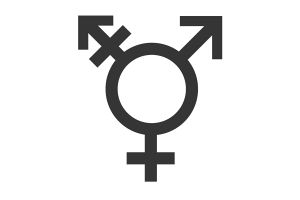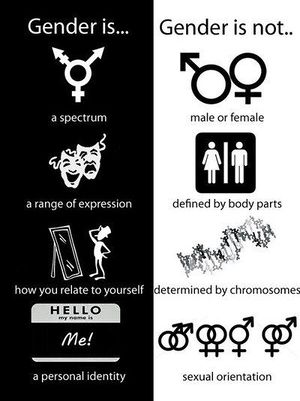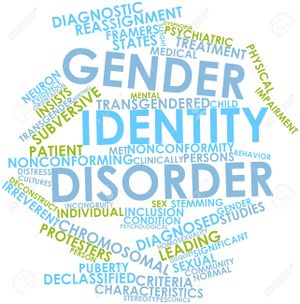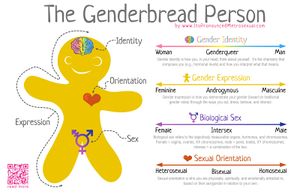Medicalization of Transgender Individuals
Page Completed by: Sara Lisk

Introduction

Over time, more individuals have started to identify themselves as Transgender, as the society continues to progress towards a more inclusive environment. Transgender individuals can be people who are either born with male or female genitalia but feel as if they were born into the wrong sex, therefore they act differently to the gender they are "prescribed" at birth. [1]
There are many outstanding issues and conflicts that arise with identifying as a Transgender individual. Conflict is especially noticeable when it comes to the medicalization of Transgender individuals and the struggles that come along with trying to identify, transition (if wanting to) and to feel self-acceptance within themselves. It is all about breaking down and challenging the binary constraints and moving away from resisting medicine and relying on it. [2]
Creating an Identity
Research has stated that an individuals gender identity is fluid, and constantly changing until the age of about 18 months. [3] Trying to find and confirm ones own identity while being Transgender is one of the toughest struggles that tons of individuals face. In the 1990's to 2000's there was a rise in people who started to identify with being Transgendered, these people were mostly individuals who were transsexual, cross dressers and also gender queer individuals.[4] Furthermore, the identity of a trans individual is build through the life course, trans identity is constantly shifting and providing different emotional experiences throughout different points in ones life. [5] It seems that perception is a huge component in finding an identity, as dealing with being a transgendered individual will be experienced differently throughout different stages of the life course, much like everything else in life.
Who Identifies as Transgender

Considering oneself Transgender can be used as an umbrella term for individuals who also identify themselves as:
- Genderqueer
- Bigender
- Genderfluid
- Pangender
- TransMan
- TransWoman
- Gender Independent
- CAMAB
- GenderCreative
And the list continues on, ensuring that the term Transgender covers many different individuals. [6]
Medical Implications
The medicalization of transgendered individuals is a topic that has many beneficial and also many consequential results arising through the medical industry. One positive note concerning the impact medicine has had is; it has let gender blending be a culturally normative thing through the medical industry. [7] This has made things seem more accepting and normative culturally because the medical field has taken a stance and allowed gender blending to be introduced into Western culture and society.[8] One thing that has been noted is that we do not have any statistics currently describing the number of individuals who are born into a gender that they do not feel they are part of. This information is not known potentially due to the medical field wanting to hide this information and try to make it appear as if people do not actually violate going against the gender that are given at birth. [9] Many individuals also choose at one point or another to go through medical procedures in order to change their physical selves in order to make it correlate with the gender that they actually want to identify with. [10]
Negative Implications
The negative implications on transgendered individuals extend not only towards the physical body but also to the mentality of the individual themselves. One main thing that has been felt among individuals who were dealing with medical professionals to alter their sex were dictated the perception of how they should act as an individual and how they should re-construct their identities as to what is seen a socially acceptable. [11] When consulting medical professionals, many individuals are deemed as empty containers that are altered by the people who are holding power (in this case medical professionals) in order to fill the emptiness of the individual with the ideals that are seen as "normative" to the rest of society.[12] The whole medical process concerning the change of the physical sex of a trans individual is a long process. This process includes consulting with numbers of doctors, psychologists and even a Gender Team which all aim to help the individual transition to the sex of their choice.[13] One issue is that these individuals are seen as medical "problems" rather than individuals that just want to feel comfortable in their own body. Due to trans individuals seen as "problems" in the medical world, they are constantly going through various interventions and programs that end up making the individual feel like they are not "normal" and just problematic.[14]
Gender Identity Disorder

Gender Identity Disorder (GID) is grouped into the negative implications because many individuals who say they are transgender end up getting classified into having an identity disorder rather than people just accepting that they are transgendered. GID can be found within the DSM-5 which is a psychological diagnosis book. The issue with being diagnosed with GID is that with having a mental disorder, you do not have the same rights as gays, lesbians and bisexuals. [15]
Positive Implications
Although there are more negative implications when it comes to the medicalization of transgender individuals there is one positive implication that outweighs the negatives. That positive implication is the feeling of acceptance, and being comfortable in one's own body. Medical procedures provide these individuals with something they have always wanted, and that is to feel like they are who they were meant to be. Having an individual feel accepting of themselves and feel complete outweighs all the negative implications that were previously listed. Studies have even proved that after people have transitioned medically, they are better off mentally and socially than they were before. [16]
Conflicting Views
There are many conflicting views between transgender individuals. One of the biggest debates further build on removing gender identity disorder from the psychological diagnosis book the DSM-5.[17]Some individuals see GID being in the DSM-5 as being useful and legitimizes people who consider themselves transgender. Other people see this as a way as transgender being classified as a psychological disorder, making people feel as if they are suffering from a disorder.[18]Therefore there are people who want to see it being classified in the DSM-5 to give a background that transgender is a concept that is not made up, but the other half are arguing that it makes people who classify themselves as transgender seem like they have a disorder.
Enforcing Gender Binary

Another conflicting view is that there are a large group of transwomen who call themselves "women of transexual history."[19] They go by this term because they do not want to be associated with the modern day transgender movement. The modern day transgender movement actually is more focused on breaking gender binaries, and just seeing gender as a fluid concept.[20] For these individuals they want to enforce the binary of gender in order to make sure there is a clear discretion between male and females. This goes to show that just because someone is transgender does not necessarily mean that they want to abolish the concepts of gender, they just want to feel physically that they are the gender that matches their anatomy.
Programs in British Columbia
There is actually a website that was created in order for transgender individuals to gain the proper access to medical and psychological care, with programs and doctors trained specifically to address any needs or concerns from trans individuals. You can go to this website by clickinghere. Here they offer a variety of programs, even a voice therapy program which is used rather than having to get an operation performed.[21]Furthermore they offer different group counseling sessions and workshops and are supportive in the individuals decisions.[22] Want to see what the organization does click to View a Short Video on the Organization

References
<references>"The Medicalization of Transgenderism - Trans Health." Trans Health. N.p., 18 July 2001. Web. 05 Aug. 2016. <http://www.trans-health.com/2001/medicalization-of-transgenderism/>.
- ↑ "Transgender Health Information Program-Gender 101." Provincial Health Services Authority. N.p., 2016. Web. 05 Aug. 2016. <http://transhealth.phsa.ca/trans-101/gender-identity/>.
- ↑ Burke, M. "Transforming Gender: Medicine, Body Politics, and the Transgender Rights Movement." University of Connecticut- Doctoral Dissertations. January 2010. Web. 04 Aug. 2016. <http://digitalcommons.uconn.edu/dissertations/AAI3464337/>.
- ↑ [1]"The Medicalization of Transgenderism - Trans Health." Trans Health. N.p., 18 July 2001. Web. 05 Aug. 2016. <http://www.trans-health.com/2001/medicalization-of-transgenderism/>.
- ↑ Sandeen, A."Trans sexualization; Trans medicalization." LGBT Weekly. 10 May 2012. Web. 04 Aug. 2016. <http://lgbtweekly.com/2012/05/10/trans-sexualization-trans-medicalization/>.
- ↑ [1]"The Medicalization of Transgenderism - Trans Health." Trans Health. N.p., 18 July 2001. Web. 05 Aug. 2016. <http://www.trans-health.com/2001/medicalization-of-transgenderism/>.
- ↑ "Transgender Health Information Program-Gender 101." Provincial Health Services Authority. N.p., 2016. Web. 05 Aug. 2016. <http://transhealth.phsa.ca/trans-101/gender-identity/>.
- ↑ [1]"The Medicalization of Transgenderism - Trans Health." Trans Health. N.p., 18 July 2001. Web. 05 Aug. 2016. <http://www.trans-health.com/2001/medicalization-of-transgenderism/>.
- ↑ [1]"The Medicalization of Transgenderism - Trans Health." Trans Health. N.p., 18 July 2001. Web. 05 Aug. 2016. <http://www.trans-health.com/2001/medicalization-of-transgenderism/>.
- ↑ [1]"The Medicalization of Transgenderism - Trans Health." Trans Health. N.p., 18 July 2001. Web. 05 Aug. 2016. <http://www.trans-health.com/2001/medicalization-of-transgenderism/>.
- ↑ [1]"The Medicalization of Transgenderism - Trans Health." Trans Health. N.p., 18 July 2001. Web. 05 Aug. 2016. <http://www.trans-health.com/2001/medicalization-of-transgenderism/>.
- ↑ [1]"The Medicalization of Transgenderism - Trans Health." Trans Health. N.p., 18 July 2001. Web. 05 Aug. 2016. <http://www.trans-health.com/2001/medicalization-of-transgenderism/>.
- ↑ Richter, B. "Who Are You to Tell Me What I Need and Don't Need: An Investigation of the Medicalization of Transsexuality in the Netherlands." SIT Digital Collections: Independent Study Project Collection. Summer 2012. Web. 04 Aug. 2016.<http://digitalcollections.sit.edu/cgi/viewcontent.cgi?article=2308&context=isp_collection/>.
- ↑ Richter, B. "Who Are You to Tell Me What I Need and Don't Need: An Investigation of the Medicalization of Transsexuality in the Netherlands." SIT Digital Collections: Independent Study Project Collection. Summer 2012. Web. 04 Aug. 2016.<http://digitalcollections.sit.edu/cgi/viewcontent.cgi?article=2308&context=isp_collection/>.
- ↑ Richter, B. "Who Are You to Tell Me What I Need and Don't Need: An Investigation of the Medicalization of Transsexuality in the Netherlands." SIT Digital Collections: Independent Study Project Collection. Summer 2012. Web. 04 Aug. 2016.<http://digitalcollections.sit.edu/cgi/viewcontent.cgi?article=2308&context=isp_collection/>.
- ↑ Dreger, A. "Why Gender Dysphoria Should No Longer Be Considered a Medical Disorder." Pacific Standard. 22 June 2009. Web. 04 Aug. 2016. <https://psmag.com/why-gender-dysphoria-should-no-longer-be-considered-a-medical-disorder-f3f9211a707a#.oc1xr69ne/>.
- ↑ Dreger, A. "Why Gender Dysphoria Should No Longer Be Considered a Medical Disorder." Pacific Standard. 22 June 2009. Web. 04 Aug. 2016. <https://psmag.com/why-gender-dysphoria-should-no-longer-be-considered-a-medical-disorder-f3f9211a707a#.oc1xr69ne/>.
- ↑ Dreger, A. "Why Gender Dysphoria Should No Longer Be Considered a Medical Disorder." Pacific Standard. 22 June 2009. Web. 04 Aug. 2016. <https://psmag.com/why-gender-dysphoria-should-no-longer-be-considered-a-medical-disorder-f3f9211a707a#.oc1xr69ne/>.
- ↑ Dreger, A. "Why Gender Dysphoria Should No Longer Be Considered a Medical Disorder." Pacific Standard. 22 June 2009. Web. 04 Aug. 2016. <https://psmag.com/why-gender-dysphoria-should-no-longer-be-considered-a-medical-disorder-f3f9211a707a#.oc1xr69ne/>.
- ↑ Sandeen, A."Trans sexualization; Trans medicalization." LGBT Weekly. 10 May 2012. Web. 04 Aug. 2016. <http://lgbtweekly.com/2012/05/10/trans-sexualization-trans-medicalization/>.
- ↑ Richter, B. "Who Are You to Tell Me What I Need and Don't Need: An Investigation of the Medicalization of Transsexuality in the Netherlands." SIT Digital Collections: Independent Study Project Collection. Summer 2012. Web. 04 Aug. 2016.<http://digitalcollections.sit.edu/cgi/viewcontent.cgi?article=2308&context=isp_collection/>.
- ↑ "Transgender Health Information Program-Services-THiP Services." Provincial Health Services Authority. N.p., 2016. Web. 05 Aug. 2016. <http://transhealth.phsa.ca/services/thip-services/>.
- ↑ "Transgender Health Information Program-Services-THiP Services." Provincial Health Services Authority. N.p., 2016. Web. 05 Aug. 2016. <http://transhealth.phsa.ca/services/thip-services/>.
<references>"Transgender Health Information Program-Gender 101." Provincial Health Services Authority. N.p., 2016. Web. 05 Aug. 2016. <http://transhealth.phsa.ca/trans-101/gender-identity/>.
<references>Sandeen, A."Trans sexualization; Trans medicalization." LGBT Weekly. 10 May 2012. Web. 04 Aug. 2016. <http://lgbtweekly.com/2012/05/10/trans-sexualization-trans-medicalization/>.
<references>Richter, B. "Who Are You to Tell Me What I Need and Don't Need: An Investigation of the Medicalization of Transsexuality in the Netherlands." SIT Digital Collections: Independent Study Project Collection. Summer 2012. Web. 04 Aug. 2016.<http://digitalcollections.sit.edu/cgi/viewcontent.cgi?article=2308&context=isp_collection/>.
<references>Dreger, A. "Why Gender Dysphoria Should No Longer Be Considered a Medical Disorder." Pacific Standard. 22 June 2009. Web. 04 Aug. 2016. <https://psmag.com/why-gender-dysphoria-should-no-longer-be-considered-a-medical-disorder-f3f9211a707a#.oc1xr69ne/>.
<references>"Transgender Health Information Program-Services-THiP Services." Provincial Health Services Authority. N.p., 2016. Web. 05 Aug. 2016. <http://transhealth.phsa.ca/services/thip-services/>.
<references>Burke, M. "Transforming Gender: Medicine, Body Politics, and the Transgender Rights Movement." University of Connecticut- Doctoral Dissertations. January 2010. Web. 04 Aug. 2016. <http://digitalcommons.uconn.edu/dissertations/AAI3464337/>.